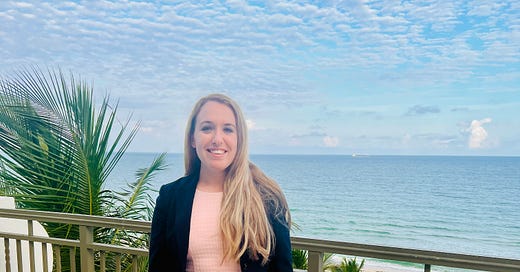Good afternoon,
For you newbies out there, welcome to Outsider on the Inside. I hope this dispatch from in and around the nation’s capital on underreported topics finds you well.
If you’re just discovering my musings, here’s a backgrounder and make sure we’re connected on Facebook, Instagram, Twitter, and YouTube.
Quick Thoughts of the Week
I’ve just returned from a work trip to South Florida and hope you’ll excuse this dispatch arriving on Saturday. A key takeaway from this trip? There are big things in store for IWF’s Center for Energy and Conservation (which I helm).
The NYSE formally withdrew its proposed SEC rule to list natural asset companies on the NYSE. VICTORY! And SCOTUS heard two challenges to the Chevron Doctrine.
Mega pop star Taylor Swift quietly bought carbon offsets to atone for her travel sins, despite offsetting being a sham practice.
First Hertz announced it’s ditching a third of its electric vehicle fleet, now Ford announced it is pulling the plug on its electric truck.
As we wait for the conclusion of Yellowstone TV on Paramount Network, the Taylor Sheridan universe is expanding to include a biopic on a legendary Comanche leader.
And stay tuned for a forthcoming op-ed from me in the RealClear family on Antiquities Act reforms dropping next week.
That’s it for this week. I’ll catch ya next Friday with more updates!
NACs Defeated & Chevron Doctrine on Notice
There were two positive developments relating to natural resources and conservation this week.
First, the Securities and Exchange Commission - to all of our surprise - pulled its proposed rule to list Natural Asset Companies (NACs) on the New York Stock Exchange ahead of its revised deadline on January 18th.
In a statement dated January 17th, SEC Assistant Secretary Sherry H. Raywood wrote “the Exchange withdrew the proposed rule change (SR-NYSE-2023-09)” without adding any reasoning.
Utah Treasurer Marlo Oaks, who led efforts with his fellow financial officers, applauded the notice of withdrawal, saying, “I am pleased by the NYSE’s decision to withdraw this dangerous proposal. I appreciate the efforts of so many to provide input to the SEC, NYSE, and their elected representatives. This news illustrates the impact of public engagement on important issues.”
There were many issues with this proposed rule.
First, the SEC had no authority to create these enterprises as they can’t oversee activities, including management and access, on private and public lands, since their mission is to “protect investors and maintain efficient markets”—not manage or conserve private and public lands.
Second, 25 Attorneys General wrote to the SEC that the NAC rule will act as a “funding mechanism” for the Bureau of Land Management’s proposed “Conservation and Landscape Health” rule to permit “conservation leases” on public lands to stop productive economic uses. The BLM rule, they argue, “is an astonishing attempt to create agency authority where none exists.”
Third, NACs would have enrolled federal lands, including National Parks, under its proposed “hybrid area” use case–an egregious affront to public lands access and multiple-use, sustained-yield management of federal lands. The Constitution clearly states only Congress–not the SEC– has the exclusive power to “dispose of and make all needful Rules and Regulations respecting the Territory or other Property belonging to the United States…” and delegate management and protection of federal lands to the Department of Interior and related agencies.
Fourth, the NAC rule would have permitted “sustainable revenue-generating operations” including the sale of carbon credits:
I was proud to play a small but active role in fighting this nefarious rule and speak before the Congressional Western Caucus staff on this concerning issue last month.
Regarding the 40th year-old Chevron Doctrine, this Supreme Court is expected to clamp down on the administrative state should it rule in favor of commercial fishermen. As I explained at Independent Women’s Forum this week:
[The plaintiffs] also argue the law National Oceanic and Atmospheric Administration (NOAA) Fisheries – or National Marine Fisheries Service (NMFS) – can’t require federal observers aboard their vessels. The plaintiffs operate in the Atlantic herring fishery, which is not required by the MSA to pay observers. The law only requires observers in three narrow instances.
This dispatch, like all related verticals of mine, will keep you abreast with all these happenings. Thanks for reading!
ICYMI
Articles/commentary/media appearances from the past week.
MEDIA MENTIONS
n/a
ARTICLES/BLOGS
Townhall: Hertz Won’t Be the Only Company to Ditch EVs This Year
Townhall: Treasurer Oaks: Biden Admin ‘Financializing Mother Nature’ With SEC Rule
Smart Women Smart Money Magazine: Here’s Why ESG is Facing Backlash
IWF: SCOTUS Hears Two Challenges To Chevron Doctrine
IWF: SEC Withdraws Controversial Natural Asset Companies Listing Rule
District of Conservation
Catch up on District of Conservation episodes below.
Thank you for reading! Let me know your thoughts and encourage your friends to subscribe to the newsletter too.
—Gabriella





The Federal Government allowing the overtake by Wall Street public land resources would be tragic for western states directly affected and the eastern states who travel west to enjoy public access lands. The undeveloped lands are critical for wildlife.